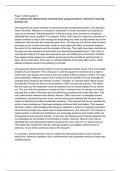Exam (elaborations)
a level psychology paper 1 2023 Q12 ethics in animal research essay(8)
- Institution
- PEARSON (PEARSON)
essay on 8 marker about ethical issues in animal research in learning theories evaluation question: 2 PEEL paragraphs and a balanced conclusion for top band marks
[Show more]



